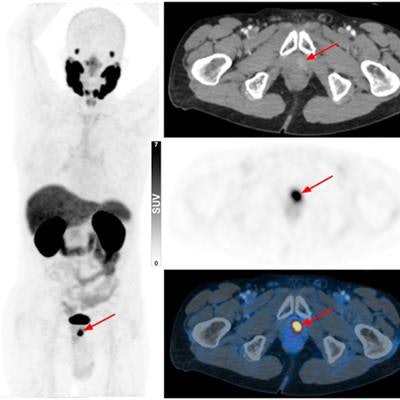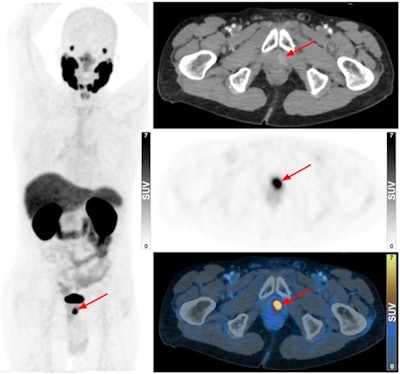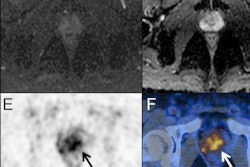
Prostate cancer PET/CT imaging can potentially obviate the need for invasive biopsies in elderly patients before they begin therapy, according to a study published April 28 in the Journal of Nuclear Medicine.
A group at Tel Aviv Sourasky Medical Center in Israel found that prostate-specific membrane antigen (PSMA)-PET/CT identified tumors and helped plan therapies in patients over 80 years old, regardless of whether they had undergone preclinical biopsies to confirm the disease. The finding suggests that pre-imaging biopsy may be waived in these patients, wrote first author Dr. Mikhail Kesler, and colleagues.
"It seems that PSMA-PET/CT is highly likely to identify and stage [prostate cancer] in patients at least 80 years old with a PSA level of at least 20 ng/mL, even without histopathologic confirmation," the group wrote.
Previous literature indicates that prostate biopsies are associated with longer hospital stays for elderly patients and that post-biopsy complications, such as infection, bleeding, or urinary retention, may occur in of up to 17% of cases, according to the authors. However, few studies have aimed to determine whether biopsy status in these patients affects therapeutic approaches.
To address this knowledge gap, the researchers analyzed data on 100 patients at least 80 years old who had undergone gallium-68 (Ga-68) PSMA-11 PET/CT scans for staging purposes. For each patient, they documented whether pre-imaging biopsy was performed, and the primary therapy received.
 Ga-68 PSMA-11 PET/CT of an 84-year-old man (no biopsy) with rising PSA levels. Focus of increased uptake was identified at left apex of prostate (arrow), indicating localized disease. Image courtesy of the Journal of Nuclear Medicine through CC BY 4.0.
Ga-68 PSMA-11 PET/CT of an 84-year-old man (no biopsy) with rising PSA levels. Focus of increased uptake was identified at left apex of prostate (arrow), indicating localized disease. Image courtesy of the Journal of Nuclear Medicine through CC BY 4.0.According to the analysis, the PET/CT scans revealed at least one avid lesion in all patients: 36 had localized disease, 25 patients were categorized as having locally advanced disease, and 39 patients had advanced disease. The median blood prostate-specific antigen (PSA) level of the group was 22.6 ng/mL (with PSA levels below 4.0 ng/mL considered normal).
According to the findings, 34 patients (34%) had no pre-imaging biopsies. In terms of staging parameters, patients without biopsies had no staging parameters significantly different from patients who had had biopsies.
Moreover, comparing therapy approaches among the total study cohort, the researchers found similar proportions of patients with biopsies (82%) and without biopsies (73%) were referred for hormonal therapy.
"Advanced disease might be more likely to be identified on their Ga-68 PSMA-11 PET/CT images, and if it is, their biopsy status does not preclude them from receiving hormonal therapy," the group wrote.
Ultimately, based on the results, the researchers noted they are developing an adjusted prostate cancer staging algorithm that may specifically reduce the numbers of prostate biopsies required in elderly patients.
"Still, larger studies are required to validate our results. If confirmed in additional series, our proposed algorithm could be implemented in the [prostate cancer] staging algorithm for elderly patients," the group concluded.




















